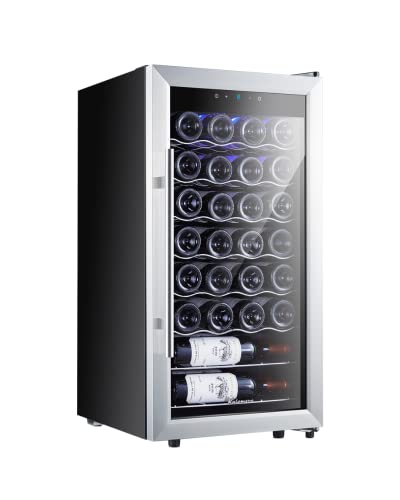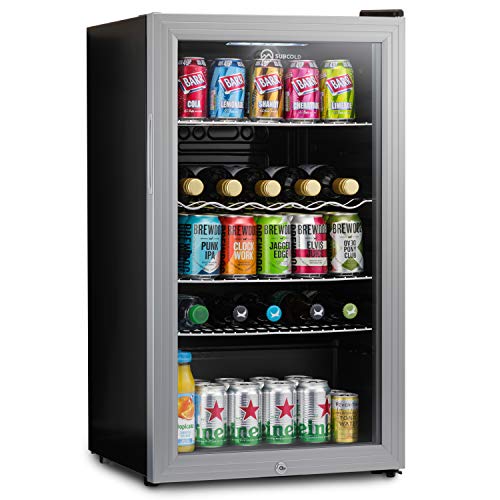History Of Beer And Wine Refrigerator: The History Of Beer And Wine Re…
페이지 정보
작성자 Constance 작성일 24-10-21 01:22 조회 7 댓글 0본문
 Choosing a Beverage and Wine Refrigerator
Choosing a Beverage and Wine Refrigerator This dual-zone refrigerator is perfect for storing and cooling both beer and wine. It can be freestanding or built-in with a sleek, seamless door that looks great in any space.
This dual-zone refrigerator is perfect for storing and cooling both beer and wine. It can be freestanding or built-in with a sleek, seamless door that looks great in any space.Although vibration is generally non-harmful however, it can cause disturbance to a bottle's sediment and cause complex chemical reactions that are less apparent. This can reduce the flavor and reduce esters over time.
Control of Humidity
Humidity refers to the amount of water vapor present in the air, and it varies throughout the day due to a number of factors. Temperature, precipitation, wind and other environmental conditions can dramatically impact the level of humidity. Keeping humidity at optimal levels is crucial for a variety of reasons. Humidity plays a role in the weather patterns and indoor air quality, and even storage of wine. Many aromatic compounds in a wine are affected by variations in humidity. When humidity is too high, it can affect the balance of these compounds and alter the flavor of the wine. A wine fridge can keep humidity levels at the ideal level to protect the wine's flavor.
A wine fridge can also help prevent the deterioration of corks as well as ensure the proper seal. Corks can dry out if the humidity is too low. This allows oxygen to get into the bottle and accelerates the process of aging. A wine fridge can help to maintain a humidity level of 55%-75 percent to stop this from occurring.
Wine coolers are also a great option to store wine and beer. A wine cellar is primarily made for long-term storage. These units often have dedicated areas for beer bottles, so you can keep your favorite craft beers or lagers right next to your favorite wines. They also come with efficient designs that regulate temperature and humidity to prevent condensation that can damage labels or packaging.
The majority of models come with a hygrometer that lets you monitor and adjust humidity levels in your wine cooler. You can also use an air humidifier inside your wine refrigerator to boost the humidity.
If you opt to use a wine fridge, put the dehumidifier inside a room that is separate from it. This will prevent the dehumidifier from absorbing any of the beer or wine that you store in the refrigerator. If you plan to keep your narrow wine fridge for a prolonged duration, controlling humidity is crucial. In a short amount of time, you may not notice any changes in your wine, but over the course of months or years, a lack of humidity can drastically alter the taste of your favorite wines.
Vibration Absorption
The vibrations in the wine fridge may interfere with the natural aging process of stored wines. Even small vibrations can trigger agitation in the sediment in the bottle, which triggers intricate chemical processes that will diminish esters and alter the wine's taste over time. In order to protect your valuable wine collection all La Sommeliere units are equipped with a unique vibration absorption system which significantly reduces the impact of tremors and noise. It also ensures that your wines age in a safe manner and quietly.
Despite the fact that wine refrigerators emit less sound than conventional refrigerators, the fans and refrigerant circuits that are used in a variety of units are still capable of creating noise. It is essential to adhere to the guidelines for clearance and put your wine cooler in a quiet location away from any other sources of noise.
Furthermore, it is recommended to clean your wine cooler using an agent that is non-abrasive and allow the unit to "air out" before filling it with bottles. This will help reduce the amount of dust and dirt that can accumulate in the air vents.
If you notice that your wine fridge is making excessive noises, it could be caused by a malfunctioning compressor or Electric Wine Chiller (Https://Supplyhead1.Bravejournal.Net/10-Things-We-Do-Not-Like-About-Wine-Refrigerator-Undercounter) fan. The compressor is typically situated in the back of the wine refrigerator. If it is placed in an unbalanced position or hits something behind it, it can shake itself free of its rubber mounts which will create loud humming sounds.
The compressor wine cooler operates similar to a conventional refrigerator by electronically compressing air molecules, which lowers their temperature, and then blowing them throughout the interior of the refrigerator. This type of cooling is significantly more energy-efficient than other cooling methods, like evaporator or frost-free refrigerators. Wine coolers with compressors are noisy and require regular maintenance. Many consumers opt for thermoelectric wine chillers that don't require a compressor.
Control of Temperature
Wine, as well as beer, has specific temperature requirements to ensure that it has the best flavor. This makes it essential to select a wine fridge for sale and beverage fridge that offers adjustable temperature controls to allow you to store your drinks at the ideal temperature for serving and storage for each style. You can also find dual-zone models that have separate temperature zones for wine bottles as well as separate temperature zones for other beverages or beer.
In general, the majority of beer styles are served colder than wines. The ideal temperature to serve the particular style will depend on the type and the method used to make it. Wheat beers and pilsners should be served between 40 and 50 degrees Fahrenheit, while IPAs, barleywines and stronger ales are best served between 50 and 55 degrees Fahrenheit. Letting a beer warm up too long will create an unpleasant "skunk" smell that can detract from the overall experience.
You'll want a wine refrigerator that has the right temperature range for your favorite whites and reds. Some wine refrigerators have humidity-control features that help prevent the cork from oxidation and keep it in good wine fridge condition. Some even feature specialized UV glass to block sunlight, which helps maintain the wine's color and protect it from premature ageing.
A refrigerator's temperature control system can be powered by either thermoelectric cooling or compressor technology. Compressors use the vapor compressor to lower temperatures in the wine refrigerator, while thermoelectric models make use of electronic convection fan technology to circulate cool air around the refrigerator. For the best results, most refrigerators incorporate these technologies.
If you plan to buy a wine fridge or beverage refrigerator that uses the compressor technology, you should look for one with shockpads that absorb vibration. The vibrations triggered by compressor-related operations can interfere with the wine's maturation process and can accelerate oxidation.
While you can purchase an appliance that is specifically designed for cheap wine fridge, you may find it more cost-effective to buy a conventional refrigerator or even a regular refrigerator that has a large interior with movable shelves and plenty of storage in the door. You can also customize the space to accommodate an array of wine, beer, and other cans and bottles.
Storage Options
If you love to host parties and have a wide range of drinks to serve think about a beverage cooler. These fridges store bottles and cans of inbuilt wine fridge and beer with other cold drinks like water and soda. They're available in freestanding and built-in versions. Built-in models can be placed under counters or inside cabinets in kitchens that have small space.
The two types of refrigerators are available in a broad variety of sizes and designs which makes them suitable for homes with a variety of. Make sure you choose models with sliding shelves to make it easier to locate your preferred beverages and wines. Some refrigerators have soft LED lighting that highlights your selection in a subtle glowing, soft glow. Some even offer an option to control humidity. This feature can stop the formation of frost inside your beer and wine bottles, allowing you to enjoy them without worrying about it.
Dual-zone refrigerators can store your most loved wines at the ideal temperature for serving. You can also store craft beer in the two separate zones because it is able to maintain similar temperatures to the wine bottle. A dual zone beer and wine refrigerator can also hold larger bottles of spirits or beer than a regular household fridge.
Keep your beer and wine in a place that has adequate lighting protection. The right conditions will extend their life. Keep the refrigerator free of dust and odors that could affect the taste of your beverages.
You should consider a cellar fridge for storage if you wish to keep a large collection and preserve its worth. This kind of refrigerator is designed to be used for long-term storage. It operates at a temperature that is slightly higher than a wine fridge, which allows your bottles to age to their peak taste. A cellar refrigerator is also equipped with an humidifier to ensure the proper humidity. This ensures that the cork remains humid and inert. It also stops external air and food items from your refrigerator from getting into the bottle and degrading it over time.
- 이전글 Boost Your Daycare Near Me By State With These Tips
- 다음글 ~ОНЛАЙН~ Три богатыря и Пуп Земли смотреть бесплатно
댓글목록 0
등록된 댓글이 없습니다.

